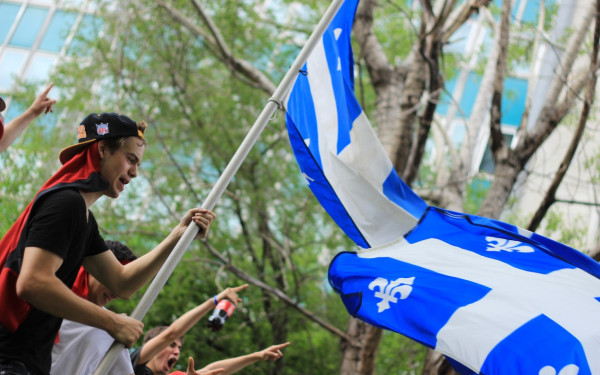Editorial
Mission Accomplished?
If you spent any of the past year with a red square pinned to your lapel, then you’re probably feeling pretty damn proud right about now.
To the dismay of those who supported the hikes—many of whom still haven’t stopped calling the protestors whining children— the students’ tactics yet again proved successful against tuition hikes. After months upon months of hard work, it’s hard not to feel a sense of victory this week.
Not 24 hours after her victory—and an attack on the Parti Québécois’s victory party at Metropolis that left one dead—newly elected Premier Pauline Marois called the Fédération étudiante universitaire du Québec.
Marois wanted to assure the association that the PQ would indeed uphold their promise to abolish Law 12, Jean Charest’s emergency legislation limiting the right to protest, and cancel the tuition hikes planned by the Liberal Party.
The PQ reached out in the same way to the Fédération étudiante collégiale du Québec, whose former president Léo Bureau- Blouin won his riding of Laval-des-Rapides for Marois’s party.
And with such announcements, it certainly feels like cause for celebration. But, as they say, it ain’t over ‘til it’s over.
It would be unfair not to give Marois a chance to rule her minority government before writing her off, and that is by no means our goal here. But we need to be careful not to be used as political tools for the new premier’s favour.
While Marois’s decision to contact student leaders before anyone else is a show of good faith, it’s also a political necessity. She has enough battles ahead of her without betraying her most vocal allies.
This change of government that, if Marois is true to her word, will radically change the direction this province has been going for the past near decade, owes its ascension to power to the printemps érable —whose heart has always been the student movement.
While Marois’s decision to contact student leaders before anyone else is a show of good faith, it’s also a political necessity. She has enough battles ahead of her without betraying her most vocal allies.
Though students can’t be given all the credit for Charest’s loss, they were certainly the impetus for change. The elections were called after deadlock in negotiations between the government and student leaders, in the words of then-Education Minister Michelle Courchesne, letting voters decide how the conflict would end.
But by that time, Quebecers of all stripes had been sounding their casseroles the whole province over in defiance of the Liberal attempt at quashing protests, the collective goal of ousting Charest became the glue that held together unions, lawyers, teachers, parents, grandparents—and students.
If Marois can’t keep students off the streets, however, then she’ll become the same demonized figure Charest is faster than you can hit a pot with a spoon.
So perhaps the ones to watch most closely after Marois is the Coalition large de l’Association pour une solidarité syndicale étudiante, with their aspirations of universally free tuition—an ideal they share with Québec Solidaire. Because what remains to be seen is whether any factions will now push to go further than what Marois has proposed.
Hikes have been blocked before, but the flat-out annulment of tuition, or even a substantial rollback of the share students have to pay, would be unprecedented. A left-leaning government like the PQ may entertain the idea, maybe through the still-vague “national discussion on education” that’s expected to take place, but with a minority government, such aspirations would put immense stress on an already precariously arranged National Assembly.
Some are predicting another election within a year, and Marois hasn’t publicly stated her party would even support a continued tuition freeze, just the cancellation of Charest’s hikes. It’s no secret that the PQ has supported the idea of tuition indexed with the rate of inflation.
When Marois is sworn in on Sept. 17, needless to say, she’ll be inheriting a multitude of opposing viewpoints in her “house,” as both Marois and Charest affectionately call their home province in French. And needless to say, we’ll be watching.

_834_554_90.jpg)
_600_832_s.png)



01web_600_375_90_s_c1.jpg)
_2_600_375_90_s_c1.jpg)